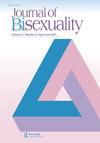Hearing What Youth Are Telling Us: A Review of Bi: Bisexual, Pansexual, Fluid, and Nonbinary Youth by Ritch C. Savin-Williams
IF 1.9
Q2 SOCIAL SCIENCES, INTERDISCIPLINARY
引用次数: 0
Abstract
For far too long, sexuality scholarship has erased and invisibilized people who are attracted to more than one gender/sex or regardless of gender/sex (e.g., bisexual, pansexual, and fluid individuals), questioned and invalidated their identities, and perpetuated harmful stereotypes about them (see Hayfield, 2021). Bi: Bisexual, Pansexual, Fluid, and Nonbinary Youth offers the promise of shining a light on the lives of these youth, celebrating their diversity and strengths, and dispelling harmful myths about their sexualities. Through interviews he conducted with bisexual, pansexual, and fluid youth, Savin-Williams offers a rare glimpse into the complexities of sexuality beyond the binary. In some ways, Bi lives up to its promises. Throughout the book, Savin-Williams calls for greater recognition of “the multitude of ways in which individuals are bisexual in their sexual and romantic profiles, developmental pathways, and life experiences” (p. 13); he emphasizes the importance of considering multiple dimensions of sexual orientation (attraction, behavior, and identity) and “expand[ing] the bounds of sexual orientation to include romantic components such as crushes, romantic fantasies, dating, love, attachment, and romantic relationships” (p. 13); and he encourages people to “celebrate the many assets possessed by bisexuals” (p. 14). Unfortunately, in other ways, Bi fails to live up to these promises—and instead perpetuates harmful stereotypes that continue to invalidate bisexual, pansexual, and fluid identities.《倾听年轻人在告诉我们:双性恋、泛性恋、流动性和非二元青年》,里奇·C·萨文·威廉姆斯著
长期以来,性学术已经抹去和隐形了那些被不止一种性别/性别或不分性别/性别吸引的人(例如双性恋、泛性恋和流动性个体),质疑和否定了他们的身份,并使对他们的有害刻板印象永久化(见Hayfield,2021)。毕:双性恋、泛性恋、流动性和非二元青年承诺照亮这些青年的生活,庆祝他们的多样性和优势,并消除关于他们性取向的有害神话。通过对双性恋、泛性恋和流动青年的采访,Savin Williams罕见地一瞥了二元性之外的性的复杂性。在某些方面,毕兑现了自己的承诺。在整本书中,Savin Williams呼吁更多地认识到“个人在性和浪漫方面、发展途径和生活经历中是双性恋的多种方式”(第13页);他强调了考虑性取向的多个维度(吸引力、行为和身份)的重要性,并“扩大性取向的范围,将浪漫成分包括在内,如迷恋、浪漫幻想、约会、爱情、依恋和浪漫关系”(第13页);他鼓励人们“庆祝双性恋者拥有的许多资产”(第14页)。不幸的是,在其他方面,毕没有兑现这些承诺,反而延续了有害的刻板印象,这些刻板印象继续使双性恋、泛性恋和流动身份无效。
本文章由计算机程序翻译,如有差异,请以英文原文为准。
求助全文
约1分钟内获得全文
求助全文
来源期刊

Journal of Bisexuality
SOCIAL SCIENCES, INTERDISCIPLINARY-
CiteScore
2.60
自引率
17.60%
发文量
32
期刊介绍:
The Washington Quarterly (TWQ) is a journal of global affairs that analyzes strategic security challenges, changes, and their public policy implications. TWQ is published out of one of the world"s preeminent international policy institutions, the Center for Strategic and International Studies (CSIS), and addresses topics such as: •The U.S. role in the world •Emerging great powers: Europe, China, Russia, India, and Japan •Regional issues and flashpoints, particularly in the Middle East and Asia •Weapons of mass destruction proliferation and missile defenses •Global perspectives to reduce terrorism
 求助内容:
求助内容: 应助结果提醒方式:
应助结果提醒方式:


